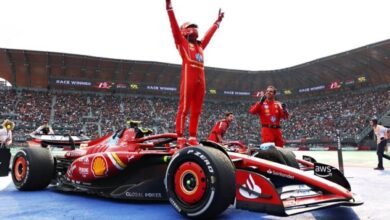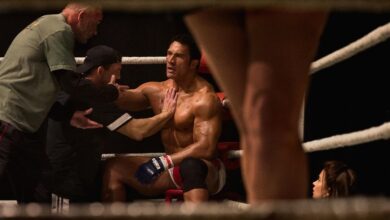“Flash” Review: Paradoxes and Nostalgia in a Multiverse of Bad Special Effects
Argentine director Andrés Muschietti adapts one of DC Comics' most famous and complex stories with mixed results in a film that seeks to be a reboot of a franchise in crisis. This is our review of "The Flash.".

Photo: Warner Bros. Pictures
LatinAmerican Post | Juan Andrés Rodríguez
Listen to this article
Leer en español: Reseña de “Flash”: paradojas y nostalgia en un multiverso de malos efectos especiales
Fans of DC comics know that there is no more important event than when Barry Allen, better known as the Flash, starts running faster than the speed of light to enter the "speed force," an energy field that concentrates the cosmic force of space-time and allows Allen to alter the continuity of events in the multiverse. This makes the speedster one of the most influential and complex characters in the history of comics, so it is unsurprising that his adaptation to the big screen will take more than 40 years.
Inspired by "Flashpoint," one of the most popular blockbusters of recent years, the character's first solo film focuses on the catastrophic consequences of a change in the timeline by Barry (Ezra Miller). Creating a world without superheroes, he must team up with an alternate version of himself, a hermit Batman (Michael Keaton), and Supergirl (Sasha Calle) to confront General Zod's (Michael Shannon) invasion in 2013.
Argentinean Andrés Muschietti led this ambitious project that introduced large audiences to the world of The Flash. This game, with time, is the perfect excuse for the reboot of a franchise that has been in crisis for years, seeking to replicate the success of its competition. As if that were not enough, the premiere was paradoxically delayed on multiple occasions by the production amid the pandemic and by the scandals of its star Ezra Miller, which eventually led to considering canceling the film's release.
This situation begs whether it was worth the wait in the face of many problems (and cost overruns for Warner). The answer is that while "The Flash" is not "the best superhero movie" as described in its first reactions, the result is solid thanks to a story with the perfect dose of nostalgia and excellent performances that counterbalance the disastrous visual effects.
The driving force of the film is Barry's relationship with his past and his longing for a different life, so the narrative structure relies heavily on Miller's dual performance, who, regardless of the controversies, deserves recognition for his fantastic work in embodying the same character in such different ways that he allows the story to flow with just the dynamics between his two versions. His charisma, geeky and youthful energy make it easy to sympathize with his situation and the dilemma involved in a seemingly simple solution. The hero's journey always brings a sacrifice, and on this occasion, Barry's decision is poignant because he takes the time to get to know the facets of the character and, with it, the value of what he must let go of.
Without losing the focus of its protagonist, there is room for the supporting characters to shine, as the film takes advantage of the familiarity and nostalgia with the multiple iterations of DC characters. One of the film's attractions is Michael Keaton's return to the role of Batman after 30 years, and it is pleasing to report that he did not disappoint. It's a very efficient continuation of his turn as the dark knight, knowing how to appeal to nostalgia with the right notes (especially with Danny Elfman's epic theme) and easily incorporate it into this new style. If this is the last time Keaton dons the black suit, there remains the satisfaction that he did it in style.
There is also an honorable mention for Hispanic American talent with the participation of Maribel Verdú as Nora Allen, Barry's mother, and the debut of Sasha Calle as Supergirl. Although they have little screen time, both are central to the plot and take advantage of every minute to make their characters endearing from opposites: maternal love and the pain of loss. With James Gunn's reboot of the DC Universe, our fingers are crossed that Calle will get to star in Supergirl's solo film and delve deeper into her "punk" version of Kara Zor-El.
Also read: What Happened to the Golden Globes and How Uncertain Is Its Future?
Films like "X-Men" established a peculiar style for depicting super-speed powers. Still, the Flash mythology is so unique and full of potential that defining its visual style is challenging and can have unforgettable excellent and bad results. Unfortunately, this is the film's central flaw and detracts from the experience, as it misleads the audience with an overloaded style on a green screen and little interest in disguising the effects.
The style of the DC films, determined by Zack Snyder's work in the early days of the franchise, such as "Man of Steel" (2013) and "Batman vs. Superman" (2016), is characterized by color desaturation and powerful CGI. This time around, that element endures, but with bright colors in essential action sequences, so no matter how attractive the choreography of a fight is, it's unconvincing and distracting because of the obviousness of the changes.
This doesn't happen throughout the film, and some moments shown from Barry's perspective when using his powers have an attractive differentiating style. Still, the lack of consistency only leads to more frustration, especially when considering the technological advances employed by other films.
Andrés Muschietti's "Flash" has the difficult task of establishing and demonstrating the potential of one of the most complex and interesting characters in comic book history. Although visually, it leaves much to be desired, Muschietti and his team achieve a powerful and entertaining story about accepting the past as part of our identity, elevated by the charisma of its actors and a good dose of nostalgia.




